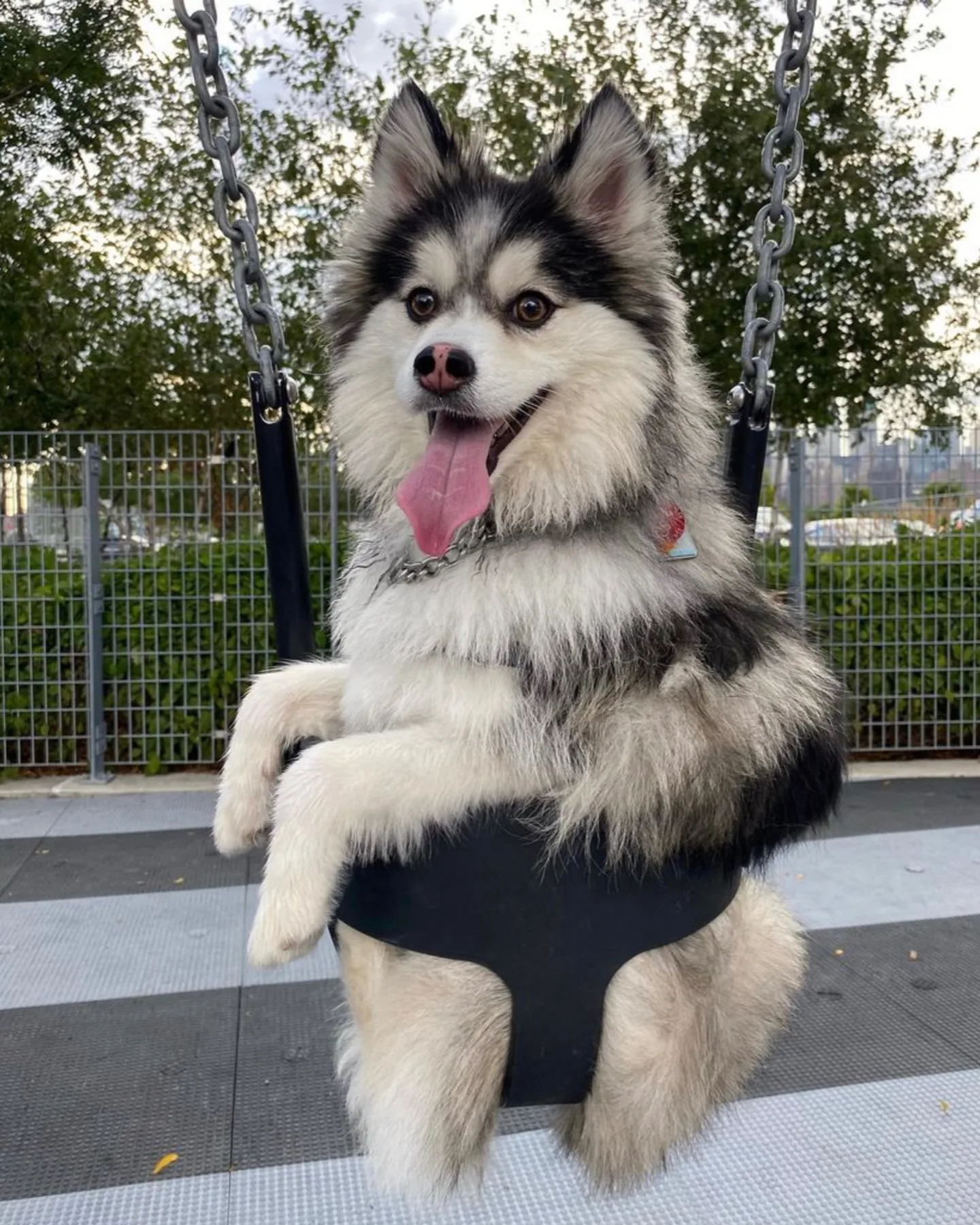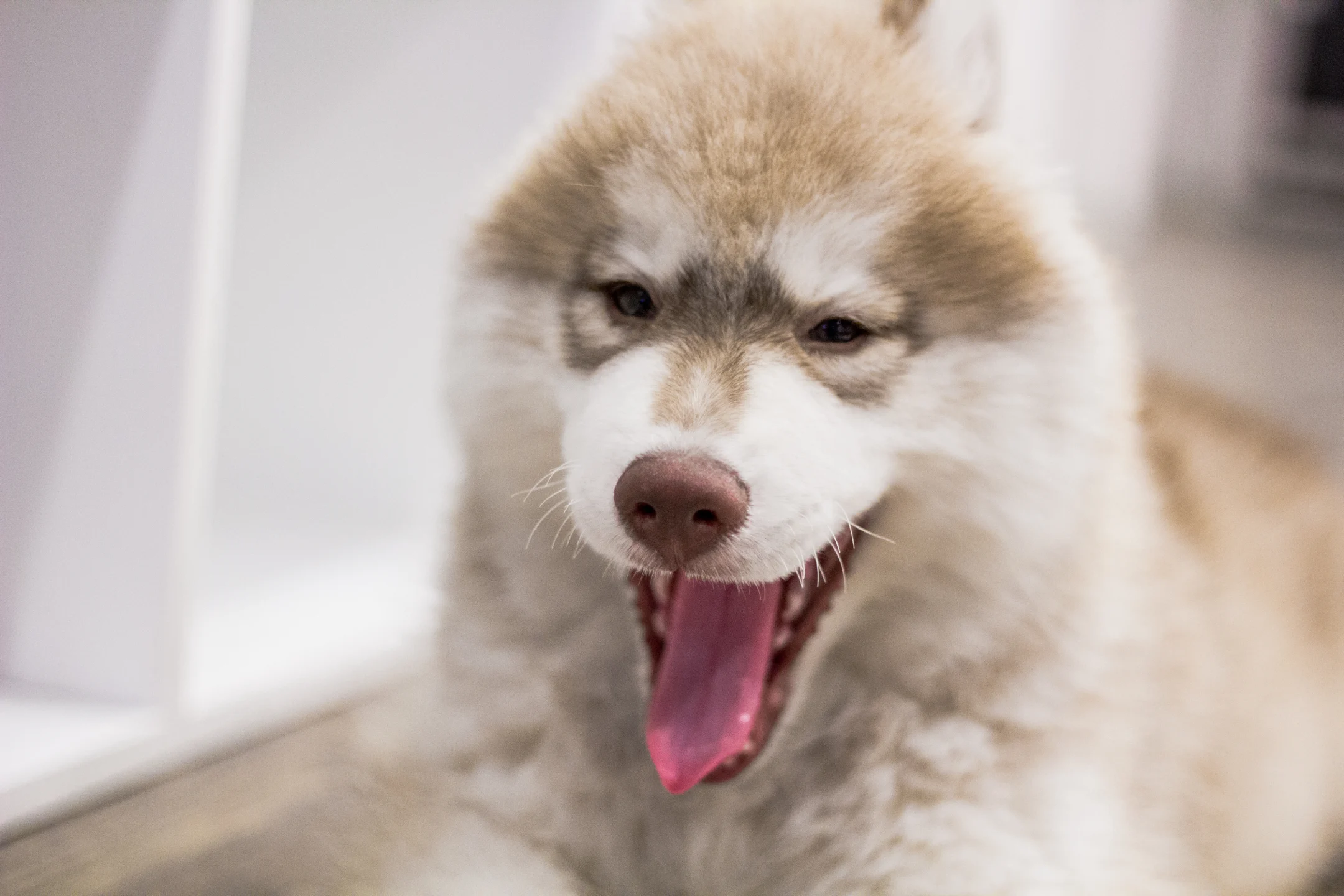It’s no secret that we are huge fans of Pomskies. We have a bunch of articles about this adorable Pomeranian and Husky mixed breed. We have already talked about how big a Pomsky gets, Teacup Pomskies, and we cleared up the question if Pomskies make good family dogs (spoiler alert: they do). But have you ever wondered: “Do Pomskies bark a lot?“.
We know that both of their parent breeds are pretty chatty, so it would be only logical if their offspring is pretty vocal too, right? Well, the answer is pretty blurry. The Pomsky can bark a lot, but he generally shouldn’t. Any well-trained canine should know not to bark for no reason. At least not excessively.
However, some dogs just like to be vocal more than others, and if yours is one of them, there is still hope. Thankfully, there are many different methods how to calm down a barking dog. In this article, we will go over all of the questions related to Pomskies and barking.
We will dive into how much these dogs bark if they howl, whether they are yappy, what could trigger their barking, and what you should do to keep things under control. Make sure you also read our other articles related to Pomsky dogs, as they could also clear up all of the other questions that may be left after this article. So let’s dive in and see if you should warn your neighbors before bringing a Pomsky puppy home.
Is the Pomsky a vocal breed?
Pomskies are talkative dogs by nature. Their Siberian Husky and Pomeranian parent breeds each contributed a certain amount of chattiness to them. Therefore, Pomskies bark and howl to communicate, express their moods, and when they sense danger. Therefore, don’t be shocked if you hear or watch your Pomsky bark loudly or howl beautifully.
The two natural characteristics of dogs are barking and howling, and Pomskies are no different. However, keep in mind two things: first, Pomskies aren’t generally noisy dogs; second, they don’t bark much until something bothersome makes them do so. As a result, Pomskies won’t be barking excessively.
The bark of a Pomsky is a tad more piercing than that of its parent Siberian Huskies. Although Pomskies are smaller than Siberian Huskies in terms of size, they have a louder voice. Pomskies will therefore be heard barking loudly and inaudible. So, if you want to include a Pomsky in your life, be ready to put up with their obnoxiously loud barking.

Source: Instagram (@dexter_pompomsky)
Do Pomskies bark a lot?
Pomskies are usually chatty dogs, however, they don’t waste their energy on excessive barking. However, a Pomsky puppy is expected to bark a lot if he isn’t properly socialized and trained when still a puppy. In addition to these two main causes, Pomsky puppies frequently bark when they are enthusiastic, anxious, or scared, need help, seek attention, or have a lot of unreleased energy.
A healthy, happy, and properly socialized Pomsky generally barks much less. Additionally, some Pomskies are so quiet that you might not even hear them bark once throughout the course of a day. This demonstrates that Pomskies are far quieter dogs than they are yappy canines.
So if you were wondering “Do Pomskies bark?”, they sure do. But they shouldn’t bark more than the average dog. This small dog likes to save his energy for other things. However, if you don’t train dogs to not bark when it isn’t necessary then their constant vocalizations could become a problem in many different ways.
Do Pomskies howl?
This varies from Pomsky to Pomsky. Because of his Husky parent breed, some Pomskies do in fact howl. You can’t know in advance if your dog carries this gene. The chances are pretty much fifty-fifty.
There are numerous videos online of Pomskies howling alongside their owners. While this is adorable, you shouldn’t ever let this become a habit. The howling could soon become annoying, not only to you but to your neighbors as well.
Pomskies typically howl to express their emotions or to try to get the attention of their owners or other dogs. Pomskies occasionally also howl in a melancholy manner in response to sirens and other loud noises. Your Pomsky may occasionally howl if you abandon them too frequently or for an extended period of time. A wailing Pomsky, though, is a rare sight, so you might not see one very often.
What are common Pomsky barking triggers?
The most common reason why dogs bark is to keep you and those near to you safe, especially if they are watch dogs. They desire to protect their family and their area, and the best way to do it is to prevent threatening individuals, animals, or others from approaching too closely. But Pomskies can start barking a lot for a variety of other possible reasons too.
Pomsky’s barking could also be an indication of worry. This is tied to the idea of intruding threats from the outside and to other triggers that could surprise them. Barking may be brought on by sudden loud noises like pyrotechnics, alarms, or sirens. Unfamiliar objects and circumstances, such as new appliances in the house or car trips to strange regions, can also be a barking stimuli.
Some dogs will then utilize barking to gain their way. They might discover that when they bark, their owner comes running, possibly with affection, snacks, toys, or other pleasant surprises. A simple link between barking and food or love encourages them to continue doing it.
Finally, there’s a chance that your dog will start barking more if they’re sick or hurt. One of the few means they have for self-expression and help-seeking is this. If your Pomsky usually doesn’t bark but has recently become more vocal, check them out to see if something is wrong. Having a Pomsky that already barks for no apparent reason other than attention makes it easy to miss the warning signs.
It is crucial to learn Pomsky dogs to regulate their barking from an early age and to avoid different triggers that could be a barking motivation.
Are Pomskies yappy dogs?
Pomskies are often not yappy dogs, but if they were not properly socialized and taught while still puppies, they may become yappy. Additionally, given that they are noisy dogs, this adds to the list of causes for their constant yapping. Pomskies don’t howl or bark very frequently. So by correctly training your Pomsky, you can ensure that he is content and does not bark.
Due to the genetic admixture, you can get a slight yapper dog if they resemble their Pomeranian parent. Pomeranians don’t usually bark a lot, but their bark has a tone that can be rather irritating. This could show up if they become overexcited or feel the urge to express themselves. You might discover that your Pomsky puppy experiences the same thing as a result. If you don’t address any unfavorable behavior patterns early on, they may start barking in the same tone constantly.
Why you shouldn’t get a Pomsky?
The Pomsky is an amazing family pet. However, that doesn’t mean that the Pom Husky mix would be the ideal fit for you. Besides the possible barking, these dogs also come with other difficulties. As smart as they are, these dogs are also incredibly stubborn. They also have a huge attitude, so training them could be challenging. That means that they aren’t the best choice for novice owners.
In addition to that, these fur babies adore attention. They want to be by your side 24/7. So it’s no wonder that they are also prone to separation anxiety. If you spend a lot of time outside of your home, and you are looking for an independent breed, this definitely isn’t the right one for you. They are very close to all of their family members, but they will form special bonds with one person. And they want to be around that person all the time.
In order for your dog to be even-tempered and calm, he also needs to get enough exercise and mental stimulation. While this is a small dog that doesn’t need too much activity, too walks a day are an absolute must. Grooming them is also quiet the tasks. Their adorable fluffy coat sheds a lot and you will have to brush them on a daily basis.
So as you can probably tell by what we have said above, you shouldn’t get a Pomsky if you are looking for a low-maintenance, independent dog breed. This is basically the exact opposite of what you are going to get with the Pomsky.

Source: Instagram (@twotwothepomsky)
How do you calm down a Pomsky?
Utilize the quiet command when your dog is barking excessively. You may think of this as archaic, but it has a lot of uses. The well-known “quiet command” is effective for teaching dogs not to bark. To begin, in your own special style, teach the dog the bark command, which is given before the quiet command. This means that if you repeat the same phrase to the dog repeatedly, it will recognize what you are saying and remain silent. The Pomsky will easily understand the quiet command once it has mastered the bark command. The quiet command will thus enable you to silence the Pomsky whenever he barks unnecessarily.
Create distractions for your Pomsky if nothing else works. This is a fantastic technique to deal with a dog who will not stop barking no matter what you do. When your pet won’t stop barking while you are in a public setting, it might be embarrassing. Everyone seems to be aware of you and wondering why you can’t control your pet’s behavior. You will need to divert your pet from this in order to spare yourself the discomfort. Use items that produce high-frequency sounds, such as a whistle, at home if you cannot easily get your pet to settle down. The Pomsky will probably quit barking once it associates it with the unpleasant sound.
How do I get my Pomsky to stop barking?
Ignoring the barking entirely unless it is caused by discomfort is one method to avoid unintentionally increasing it. It may seem bad to ignore the barking, but Pomskies crave human attention, and if they are unable to get it because of their barking, they will be forced to stop. Don’t talk, smile, yell at the dog, or even look at it. Wait about three minutes after he stops barking before you pay him any attention or give him a reward.
Your Pomsky will become exhausted and lose his desire to bark or howl if you give him adequate mental and physical exercise. Additionally, this will keep him from becoming bored and destructive. Pomskies require between 30 and 45 minutes of stimulation each day, which can be provided by regular walks, playtime, and even brainteasers like dog puzzles.
By distracting your Pomsky just before he is going to bark or by eliminating the barking trigger, you can get rid of the motive for barking. Take him inside if he barks at other people or cars when they are nearby. Likewise, if he barks while gazing out the windows, draw the curtain to block the trigger. A strange sound or smell, such as a dog diversion spray, can be used to divert this dog’s attention away from its barking or wailing.
When teaching your Pomeranian Husky mix to quit barking, you will need high-value treats, perseverance, time, and consistency. The dog should enjoy the training sessions, which should last between 5 and 10 minutes. When teaching your dog, be firm but do not yell at or hit him. By exposing him to various settings, people, and animals as part of his training, he will also receive healthy socialization.
Conclusion: Do Pomskies bark a lot?
So do Pomskies bark? Of course they do, but how much they bark is up to Pomsky owners. You have to make sure they get the bark training they need, and that they don’t develop into attention seekers that bark for no reason.
Barking at unfamiliar things is common for all dogs, but a pup that is properly trained, socialized, and gets enough exercise, daily walks, and mental stimulation, shouldn’t bark for no reason. You should also teach them not to bark at new people or dogs. You will have a long way after bringing a Pomsky puppy home, but all of that hard work will be worth it in the end.
You can’t just adopt a new dog and accept he is ready to go and knows how to behave. And the same goes for Pomskies. We know that unnecessary barking or howling can be annoying. But as we already explained, with the right training this shouldn’t be an issue. If you are a first-time dog owner, and this is a bit overwhelming to you, consider enrolling your pup in dog training classes, or hiring a professional dog trainer.
Whatever you decide to do, investing either time or money into dog training will make your life with your new pup so much easier. And needless to say that your neighbors will be much happier too, as they won’t have to listen to your dog the whole time. If you have some tips on how to avoid excessive barking in all dogs, but especially Pomskies, make sure you leave us a comment.

